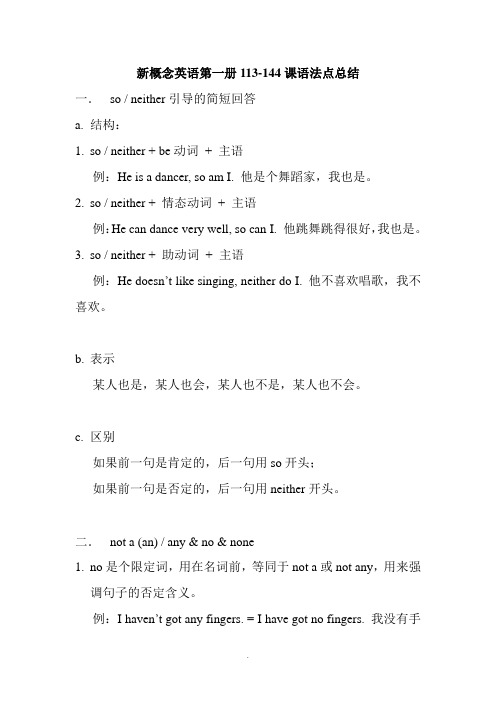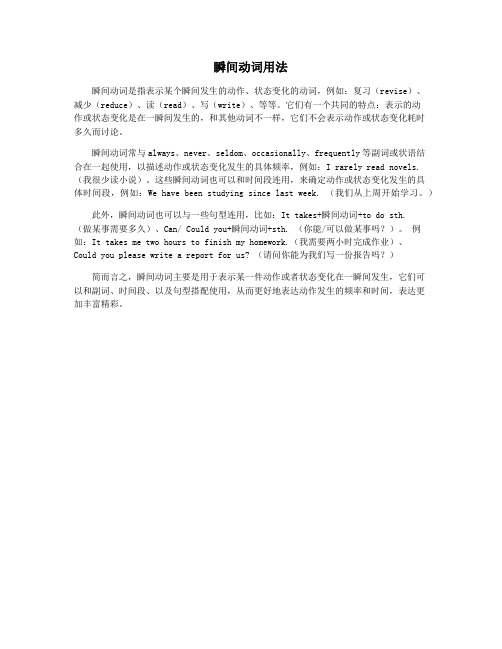瞬间动词的进行式用法
英语瞬间动词表完成状态的用法

一、瞬间动词与现在完成时英语中,有些动词只表示短暂的动作,所表示的动作瞬间即可完成,因此这类动词称为瞬间动词或终止性动词。
如:close, open, join, buy, die, begin, start, come, go等。
瞬间动词都可以表示动作“已完成”。
如:I have lost my watch.我把表丢了。
瞬间动词不能和表示一段时间的短语或从句连用。
不能与How long 连用I have bought my watch for ten years.(×)She has turned on the light since she came in. (×)瞬间动词的“已完成”动作如果要与表示一段时间的状语(或状语从句)连用,一般可以通过下面几种方式来表示:1. 用意义相近或相同的延续性动词来代替,这种延续表达法大都是表示状态的。
如:His father has been dead for five years.(not“has died”)他爸爸去世五年了。
为了便于掌握,下面将瞬间动词转换成延续性动词的情况列举如下:arrive, come→be here, be inbegin, start→be onbuy→havedie→be deadfinish, end→be overget up→be upgo out→be outjoin→be in, be a +名词leave, move→be away, be out ofborrow→keep2. 用“It is/ has been +时间+since…”句型。
如:It is/ has been 10 years since I last saw him.(从我上次见到他以来已经10年了。
)It is five minutes since the meeting began. 会议开始五分钟了。
It is two years since we got to know each other. 我们互相认识已有两年了。
英语人教版八年级下册现在完成时态中瞬间动词的用法

现在完成时态中瞬间动词的用法延续性动词和非延续性性动词一、延续性动词与非延续性动词的特征英语中,按动作发生的方式、过程的长短,可将动词分为延续性动词和非延续性动词。
延续性动词,也叫作持续性动词,表示能够延续的动作,这种动作发生后可以一直持续下去。
如:learn, work, stand, lie, know, walk, keep, have, wait, watch, sing, read, sleep, live, stay等。
非延续性动词,也叫作终止性动词、瞬间性动词或短暂性动词,表示不能延续的动作,即动作从发生到结束所持续的时间非常短,且大多都是动作发生后也就马上结束。
如open, close, finish, begin, come, go, arrive, reach, get to, leave, move, borrow, buy等。
二、延续性动词与非延续性动词的用法1、延续性动词可以和表示"一段时间"的状语连用。
表示"一段时间"的短语结构有:for two weeks, in/during the past three years, since 1990, how long, from Monday to Friday ,between 8:00 to 11:00, all the year round等。
如:I have learned English since I was six years old.从六岁以来,我就学英语了。
2、非延续性动词表示的动作具有短暂性和不可持续性等特点,因此,其肯定句不可与表示“一段时间”的状语连用。
但是非延续性动词的否定结构表示状态时,可以和表示“一段时间”的状语连用。
如:正确:He has bought some books.(没有表示“一段时间”的状语) 正确:He hasn't bought any books for a long time.(否定句可与表示“一段时间”的状语连用) 错误:He has bought the books for 3 days.(肯定句不能和表示“一段时间”的状语连用)3、while引导时间状语从句时,表示的是一个较长的时间或过程,属于“一段时间”,从句中的谓语动词用延续性动词。
瞬间动词的用法

瞬间动词的用法1.begin / start -------The meeting began 30minutes ago.The meeting for 30 minutes.2.die -------He died 2 weeks ago.He for 2 weeks.3.leave -----They left Wuhan 3 days ago.They Wuhan for 3 days.4.become------Jim became a doctor one year ago.Jim a doctor for one year.5.finish ----The meeting finished an hour ago .The meeting for an hour.6.borrow------He borrowed a pen from me two days ago.He a pen for two days .7.buy-----She bought some fruit 3 hours ago.She some fruit for 3 hours .e here-----They came here 10 minutes ago.They here for 10 minutes .9.go there-----The boys went there 2 hours ago.The boys there for 2 hours .e to China-----①The Greens came to China 5 months ago .The Greens China for 5 months .②He went to the USA 10 years ago .He the USA for 10 years.11.join -----①He joined the army two years ago .He the army for 2 years .He a soldier for 2 years .②I joined the English club 3 months ago .I the English club for 3 months .I of the English club for 3 months.12.marry-----They married ten years ago.They for ten years.12.catch a cold-----He caught a cold last week.He a cold for a week.13.get / arrive here/ there----14.get to / arrive in China----。
新概念英语第一册113-144课语法点总结

新概念英语第一册113-144课语法点总结一.so / neither引导的简短回答a.结构:1.so / neither + be动词+ 主语例:He is a dancer, so am I. 他是个舞蹈家,我也是。
2.so / neither + 情态动词+ 主语例:He can dance very well, so can I. 他跳舞跳得很好,我也是。
3.so / neither + 助动词+ 主语例:He doesn’t like singing, neither do I. 他不喜欢唱歌,我不喜欢。
b.表示某人也是,某人也会,某人也不是,某人也不会。
c.区别如果前一句是肯定的,后一句用so开头;如果前一句是否定的,后一句用neither开头。
二.not a (an) / any & no & none1.no是个限定词,用在名词前,等同于not a或not any,用来强调句子的否定含义。
例:I haven’t got any fingers. = I have got no fingers. 我没有手指。
I haven’t got a long tail. = I have got no long tail. 我没有一条长尾巴。
2.none: 没有人;一个也没有;一点儿也没有例:He has got many interesting books. I have got none.他有很多有趣的书,我一本也没有。
三.不定代词either; both; all; neither; none注意:either表示两者任选其一。
例:Which one do you want, an apple or a pear? Either is Okay.你想要苹果还是梨?都可以。
Either of my parents will come to see you. 我爸爸或者妈妈会来见你。
瞬间动词用法

瞬间动词瞬间动词,也叫终止性动词、结束性动词、非延续性动词。
这类动词所表示的动作在瞬间就可以完成,不能延续下去,即动作从开始到结束所持续的时间极短。
瞬间动词往往表示动作的结果,或表示短暂性、一次性的动作。
一般不能同表示一段时间的状语连用。
(一)这类动词常见的有:arrive,become,begin,buy,catch(感染,染上,如:catch a cold),close,come,fall,fall ill,find,get to(know),go,hear,hear from,join,kill,land(着陆),leave(离开),lose,see,等。
例如:1. He has joined the club for a long time. (错)2. He has been a member of the club for a long time . (对)3. His grandfather has died for over 30 years. (错)4. His grandfather has been dead for over 30 years . (对)【注意】之所以将这些动词称为瞬间动词,是因为这些动词在眨眼之间发生并终结。
故不能与表达“段”的长时间状语连用,不论是在进行时还是现在完成时中。
下面的例句是正确的:1. He is dying.2. He has died.一个生物体是死是活,界与其终结生命的前与后的一霎那,如果上述例句加上了表达段的时间状语,试请问:该人是死是活?(二)但是,有几个表示去向的非延续性动词如go,come,start,leave 等,可以同表示时间段的状语for 短语连用。
但要注意,这种用法的for 短语表示的不是句中谓语动词延续的时间,而是该动词动作完成后再做某事所需要的时间。
例如:1. She has gone to Nanjing for three days. (= She’s come here,intending to stay for three days.)2. Alice has left for Paris for three months . (= Alice has left for Paris ,intending to stay there for three months.)3. We are starting for Shanghai for two weeks. (= We are going to Shanghai ,and we are planning to stay there for two weeks.)【注意】如果遇到与第一点所不符的情况,如本点所讲述,不要轻易下结论为“错题”,应该认真分析后再做结论。
谈谈瞬间动词的进行式用法

谈谈瞬间动词的进行式用法在通常情况下,瞬间动词是不用于进行时态的。
但某些特殊场合,瞬间动词也可用于进行时态,其用法主要有以下几种:一、表示反复或重复英语中有少数瞬间动词可以用于现在进行时表示不断重复的动作,这类动词主要有j ump, knock, kick, hit, nod, tap, wink, cough, shoot, drop等。
如:Someone is knocking. 有人敲门。
John is nodding his head. 约翰频频点头。
He is jumping up and down. 他上下地跳着。
Why is she blinking her eyes? 她为什么老眨眼睛?如果主语为复数,某些动词的现在进行时往往有“不断”或“一个接一个”的含义,如:People are dying in that part of the world. 在那个地方人们不断地死去。
Men are dropping with malaria, dysentery and simple starvation. 士兵们由于疟疾、痢疾或仅仅因为饥饿一个接一个地倒了下去。
二、表示即将发生注意有些瞬间动词的现在进行时并不表示动作的重复,而是表示动作即将发生。
如:Julyan is coming right away. 朱利安马上就来。
She is getting married next December. 她12月结婚。
What time are you leaving? 你什么时候动身?They’re having a party next week. 下星期他们将开一个晚会。
You’re young people. You ate only beginning to live. 你们是年轻人,刚刚开始生活。
三、表示即将结束有些瞬间动词的现在进行时则表示动作即将结束,如:I am finishing. 我快做完了。
瞬间动词用法

瞬间动词用法
瞬间动词是指表示某个瞬间发生的动作、状态变化的动词,例如:复习(revise)、
减少(reduce)、读(read)、写(write)、等等。
它们有一个共同的特点:表示的动
作或状态变化是在一瞬间发生的,和其他动词不一样,它们不会表示动作或状态变化耗时
多久而讨论。
瞬间动词常与always、never、seldom、occasionally、frequently等副词或状语结
合在一起使用,以描述动作或状态变化发生的具体频率,例如:I rarely read novels.(我很少读小说)。
这些瞬间动词也可以和时间段连用,来确定动作或状态变化发生的具
体时间段,例如:We have been studying since last week. (我们从上周开始学习。
)
此外,瞬间动词也可以与一些句型连用,比如:It takes+瞬间动词+to do sth.
(做某事需要多久)、Can/ Could you+瞬间动词+sth. (你能/可以做某事吗?)。
例如:It takes me two hours to finish my homework.(我需要两小时完成作业)、
Could you please write a report for us? (请问你能为我们写一份报告吗?)
简而言之,瞬间动词主要是用于表示某一件动作或者状态变化在一瞬间发生,它们可
以和副词、时间段、以及句型搭配使用,从而更好地表达动作发生的频率和时间,表达更
加丰富精彩。
动词的进行时态及使用方法

动词的进行时态及使用方法动词的时态是英语语法中一个重要的概念,它帮助我们表达不同的动作发生的时间,包括过去、现在和将来。
在时态中,进行时态是指正在进行或正在发生的动作。
本文将详细介绍动词的进行时态及使用方法。
一、什么是进行时态进行时态(Progressive Tense),又称进行式或现在进行时,是表示动作正在进行的一种时态。
它由be动词的不同形式和动词的现在分词形式构成。
进行时态可以用来描述现在正在进行的动作,也可以用来表示暂时性动作或动作发展过程中的变化。
例如:1. I am studying English now.(我现在正在学习英语。
)2. They are playing football in the park.(他们正在公园里踢足球。
)3. She is watching a movie at home.(她正在家里看电影。
)二、进行时态的基本结构进行时态的基本结构由be动词的不同形式和动词的现在分词形式构成。
1. 现在进行时的结构:主语 + am/is/are + 动词的现在分词例如:1. She is reading a book.(她正在看一本书。
)2. They are eating dinner.(他们正在吃晚饭。
)3. We are playing basketball.(我们正在打篮球。
)2. 过去进行时的结构:主语 + was/were + 动词的现在分词例如:1. He was studying in the library yesterday.(昨天他在图书馆学习。
)2. We were having a party at that time.(那时候我们正在开派对。
)3. They were talking loudly in the classroom.(他们正在教室里大声说话。
)3. 将来进行时的结构:主语 + will be + 动词的现在分词例如:1. He will be waiting for you at the airport tomorrow.(明天他将在机场等你。
- 1、下载文档前请自行甄别文档内容的完整性,平台不提供额外的编辑、内容补充、找答案等附加服务。
- 2、"仅部分预览"的文档,不可在线预览部分如存在完整性等问题,可反馈申请退款(可完整预览的文档不适用该条件!)。
- 3、如文档侵犯您的权益,请联系客服反馈,我们会尽快为您处理(人工客服工作时间:9:00-18:30)。
瞬间动词的进行式用法
在通常情况下,瞬间动词是不用于进行时态的。
但某些特殊场合,瞬间动词也可用于进行时态,其用法主要有以下几种:
一、表示反复或重复
英语中有少数瞬间动词可以用于现在进行时表示不断重复的动作,这类动词主要有ju mp, knock, kick, hit, nod, tap, wink, cough, shoot, drop等。
如:
Someone is knocking. 有人敲门。
John is nodding his head. 约翰频频点头。
He is jumping up and down. 他上下地跳着。
Why is she blinking her eyes? 她为什么老眨眼睛?
如果主语为复数,某些动词的现在进行时往往有“不断”或“一个接一个”的含义,如:People are dying in that part of the world. 在那个地方人们不断地死去。
Men are dropping with malaria, dysentery and simple starvation. 士兵们由于疟疾、痢疾或仅仅因为饥饿一个接一个地倒了下去。
二、表示即将发生
注意有些瞬间动词的现在进行时并不表示动作的重复,而是表示动作即将发生。
如:Julyan is coming right away. 朱利安马上就来。
She is getting married next December. 她12月结婚。
What time are you leaving? 你什么时候动身?
They’re having a party next week. 下星期他们将开一个晚会。
You’re young people. You ate only beginning to live. 你们是年轻人,刚刚开始生活。
三、表示即将结束
有些瞬间动词的现在进行时则表示动作即将结束,如:
I am finishing. 我快做完了。
It is ceasing to rain. 雨快停了。
The fruit is ripening. 这果子快熟了。
It was my painful duty to tell her that he was dying. 要我把他即将去世的事告诉她,这使我十分为难。
